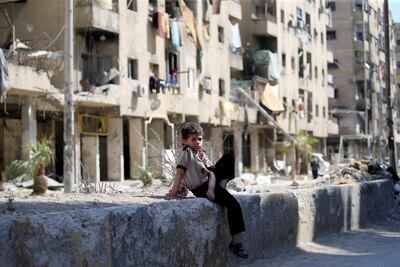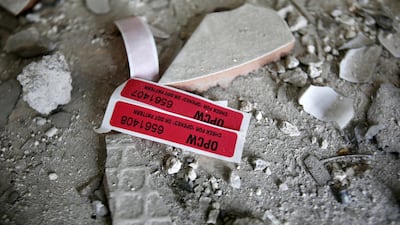Two weeks of Syrian and Russian delays and obstructions may have resulted in vital chemical evidence “slipping away” in Douma, the rebel-held enclave on the outskirts of Damascus where a regime gas attack is believed to have killed scores of people, according to a top former chemical weapons inspector.
Investigators from the Organisation for Prohibition of Chemical Weapons (OPCW) finally reached the city on April 21 after a series of postponements, including their security team coming under gunfire in the area of the gas attack. They have now launched an independent investigation that will seek to find if any noxious substances were used in the April 7 attack that killed at least 43 people.
The inspection team has collected samples from at least two sites that will now be examined at The Hague, after visiting a second location on Wednesday. But Jerry Smith, who helped oversee the OPCW-led withdrawal of much of Syria's sarin stockpile in 2013, says every hour, day or week of delay may have diluted what the inspectors will eventually uncover in Douma.
"The time between the actual incident and investigators getting there might result in the evidence slipping away", Mr Smith told The National by phone.
The inspectors’ mission could be damaged either because the chemicals may have dissipated naturally or through the tampering of evidence.
“Every day they are denied access and every day the site is insecure there is the potential for stakeholders to go in and take active measures to reduce the chances of inspectors finding any agents”, the chemical weapons expert said.
“There might be a chance that environmental materials and chemicals will degrade or stakeholders who have an influence might want to try to hide that evidence.”
____________
Read more:
The ‘crazy club’: Inside the British propaganda trips that seek to legitimise Assad’s barbarism
Syrian government launches anti-ISIS operation in Damascus
There's only one winner from missile strikes in Damascus
____________
The problem with a chemical such as chlorine, if it was the substance used in the attack, is that it cannot be sampled in the air unless an individual is present at the time of it being used offensively, Mr Smith said.
“Finding some in the first place is difficult but proving that it is actually used as weapon as opposed to a cleaning product is even more challenging,” he said.
Both Moscow and Damascus, which now control Douma, deny chemical arms were used. Russia placed the blame on the West by stating it was a “staged provocation”.

Earlier this month, Russia told the UN Security Council that its experts found no evidence of “toxic substance use” in the area.
But reports have emerged of Syrian officials subjecting Syrian medics and residents to intimidation after the attack, taking samples and demanding their silence. Douma residents have said that Syrian and Russian officials had shuttered sites before the inspection team’s arrival.
The US government also revealed last Thursday that it had credible information both Damascus and Moscow were working to delay the inspectors from conducting their probe.
Ultimately, the inspectors will likely be under the careful watch of the Syrian and Russian officials that control the area of the attack site, and may even come under pressure from them, meaning that no investigation can ever be truly independent.
“They have to play with a straight bat and look at doing the best they can with these three elements: gathering samples, statements and documents as evidence”, Mr Smith concludes. “But they have to carry out their report with a bunch of constraints that were placed upon them”.
The world now awaits what the organisation – which has been investigating the use of toxic chemicals in the country since 2014 – will uncover at the latest scene of horror in Syria’s brutal civil war.


